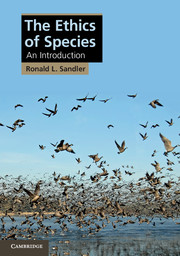Book contents
4 - Assisted colonization
Published online by Cambridge University Press: 05 November 2012
Summary
In response to the conservation biology dilemma, many conservation biologists, ecosystem managers, and environmentalists have begun to advocate for a new species preservation strategy, assisted colonization (or managed relocation). Assisted colonization is intentionally moving individuals of a species to a location where there is no existent population of the species, sometimes beyond their historic range, and the establishment of a viable independent population in that location, for the purpose of preventing the species from going extinct. The motivation for assisted colonization is that, unless some such practice is adopted, conservation biology will be reduced to “managing extinctions,” rather than preserving species.
Moving species outside their historic ranges may mitigate loss of biodiversity in the face of global climate change . . . We must contemplate the possibility that some regions of the Earth will experience high levels of warming (>4°C) within the next 100 years, as well as altered precipitation and ocean acidity. Under these circumstances, the future for many species and ecosystems is so bleak that assisted colonization might be their best chance.
Assisted colonization is rapidly gaining proponents and, in some cases, practitioners. In the United Kingdom, two butterfly species have been successfully translocated northward to sites that climate-species models suggest will be more conducive to their long-term survival than their prior range. In Canada, scientists have relocated dozens of tree species to locations beyond their recent historical range; in the United States, an environmental group called the Torreya Guardians has translocated specimens of Torreya taxifolia, a threatened conifer, from its present range in Florida to a more northerly location in North Carolina. Several other species – such as the Quino checkerspot butterfly (Euphydryas editha quino) in California, the Iberian lynx (Lynx pardinus) in Spain, and the whitebark pine in British Columbia – have been proposed as candidates for assisted colonization, and several models for guiding decision making on when intentional translocation is an appropriate conservation strategy have been developed.
- Type
- Chapter
- Information
- The Ethics of SpeciesAn Introduction, pp. 75 - 99Publisher: Cambridge University PressPrint publication year: 2012



